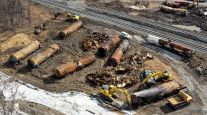Senior Reporter
House Passes FEMA Aid Bills

[Stay on top of transportation news: Get TTNews in your inbox.]
Legislation designed to expedite post-disaster construction of infrastructure projects in states was easily passed by the U.S. House of Representatives earlier this month.
House lawmakers approved the Hazard Eligibility and Local Projects (or HELP) Act, sponsored by Reps. Lizzie Fletcher (D-Texas) and Michael McCaul (R-Texas). The measure aims to expedite certain classifications of projects after a presidentially declared disaster.
The bill specifically is designed to allow agencies to proceed with land acquisition and construction projects without requiring certain reviews. Kicking off the project would not risk missing out on federal matching funds. Recent hurricanes and other severe weather events have prompted federal lawmakers to heighten their response to reconstruction efforts. Via policy updates to FEMA and other agencies, transportation policymakers say they seek to facilitate access to recovery funds and aid.
The first bill I introduced in Congress was one developed with our community based on the lessons we learned after Harvey.
I am so glad to report that it passed the House this week! On to the Senate. #HELPAct pic.twitter.com/NctFzAQGpn — Rep. Lizzie Fletcher (@RepFletcher) November 6, 2021
“In Houston, we know disaster recovery can be a prolonged, yearslong process,” said Fletcher on Nov. 4. “By allowing certain disaster mitigation and recovery projects to begin more quickly without jeopardizing potential federal funding, the HELP Act provides a straightforward solution to a real problem that will have a meaningful impact at home and across our country. I am proud of this bill and all it represents, bipartisan, common-sense, meaningful legislation to help expedite disaster mitigation projects. The HELP Act was born out of a partnership with leaders from Texas’ 7th congressional district and will benefit all Houstonians.”
“Texans are unfortunately too familiar with natural disasters,” said McCaul. “This critical piece of legislation will ensure we can streamline mitigation measures to protect our communities for the years to come. By eliminating this bureaucratic red tape we can speed up the process of key flood prevention measures, directly addressing the delay of federal assistance many Texas communities encounter.”
RELATED: House Transportation Panel Approves FEMA Recovery Bills
Co-sponsors in the House include Reps. Colin Allred (D-Texas), Del. Jenniffer Gonzalez-Colon (R-P.R.), Gregory Murphy (R-N.C.), G.K. Butterfield (D-N.C.), and Tom Rice (R-S.C.). The measure has yet to be considered in the U.S. Senate.
Separately, the House passed the Preliminary Damage Assessment Improvement Act. Sponsored by Rep. John Katko (R-N.Y.), the bill would direct FEMA to establish preliminary damage assessment, or PDA, teams. The teams would have expertise in working with state, tribal and territorial partners and Congress.
Specifically, the bill would establish an advisory panel of state and local personnel from the FEMA regions to work with the agency on enhancements to the assessment process. It also would implement standardized training for FEMA personnel in order to ensure PDAs are reviewed under standard guidelines. And it would direct FEMA to provide information regarding its PDA procedures, including efforts to ensure communication with state and local officials.
“I am proud to announce the passage of the Preliminary Damage Assessment Improvement Act,” said Katko. “Persistent flooding along Lake Ontario, as well as recent flooding disasters in Cayuga County and across central New York, have underscored the need to enhance FEMA’s processes for delivering disaster aid. My bipartisan legislation takes important steps to make these improvements and ensure timely and reliable relief for disaster-impacted communities.”
“From Rensselaer to Dutchess, upstate communities have been hit hard by natural disasters. I am proud that our bipartisan legislation to provide more consistent and timely relief to those affected by extreme weather events has been passed by the House,” said Rep. Antonio Delgado (D-N.Y.), a co-sponsor. “Flooding continues to be a dangerous and costly threat. This legislation will ensure our local communities receive support faster by making FEMA’s preliminary damage assessment process more consistent and reliable.”
The legislation has yet to pass in the U.S. Senate.
Want more news? Listen to today's daily briefing below or go here for more info:


